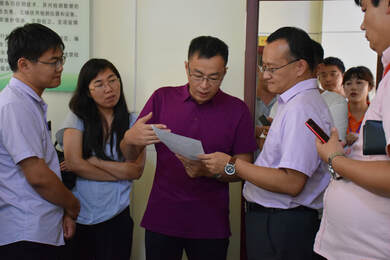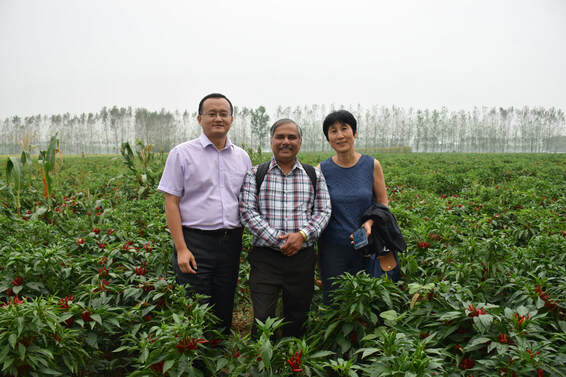 "Using stakeholder workshops, Wantao hopes to develop Big Data solutions that effectively connect all the players in Chinese food supply chains (Photo credit: Science and Technology Backyard in Henan Province). "Using stakeholder workshops, Wantao hopes to develop Big Data solutions that effectively connect all the players in Chinese food supply chains (Photo credit: Science and Technology Backyard in Henan Province). “We’re working to address a critical knowledge gap challenge in the agricultural sector so that data-driven approaches can be used to enhance agricultural sustainability and productivity in China”. As Professor of Supply Chain Management at the University of Roehampton, Wantao Yu has a vision to see a Big Data revolution transform the agri-food sector. Blockchain, Big Data and Internet of Things (IoT) technologies are being hailed as a game-changer for supply chains. Many of these systems are based on using online ledgers and databases to record transactions so that information can be accessed instantly (but not changed) by every member of the chain. The potential benefits for the food sector range from increasing transparency, guaranteeing province of origin, helping enforce environmental and food safety regulations and allowing farmers to access the best markets for their goods. But many places face grand challenges in implementing digital technologies (e.g., IoT, blockchain and big data) in agricultural supply chains, particularly in rural regions of China, such as Henan Province. “In the news we hear that big progress has been made in China over the past 20 years but this has really been concentrated in major cities” Wantao says. “In the western and central regions like Henan Province, most farmers work only on a small scale and are currently experiencing multiple problems” including environmental pollution, mass-migration to urban cities and increasing concerns over food safety. Not surprisingly promoting digital technologies can be “a hard sell” as Wantao says: “Most farmers earn such a low income that their sole focus is on making more profit. Besides this, the average age of a rural farmer in Henan Province is between 50 and 60, so there is a huge knowledge gap when it comes to new technologies”. Working with the STFC Food Network+, Wantao hopes to overcome this gap and deliver these technologies directly to those who could benefit. Working closely with Dr Tom Kirkham and Mr Tom Collingwood, IoT and Blockchain specialists at STFC Hartree Centre, Wantao has organised one workshop in Henan Province, China and another workshop in London, to discuss the potential applications of digital technologies in agricultural value chains. One of the reasons why he chose to focus first on Henan Province is that this is the official ‘breadbasket of China’, producing most of the country’s wheat and maize and containing over 50 million smallholder farmers. Crucially, Wantao has also already established a strong relationship with Henan University and Henan Agricultural University which deliver training programmes for farmers through its education centre (e.g. Science and Technology Backyard in Henan Province). In Wantao’s view, involving farmers from the start through workshops and focus groups will be key to delivering resources that they can understand and use. “We hope the farmers themselves will become the ambassadors” he says. In collaboration with Henan University and Science and Technology Backyard managed by Henan Agricultural University, he plans to use a whole range of media to facilitate this dissemination including leaflets, videos, brochures, posters, TV, newspapers and social media. Wantao is also using his connections to encourage actors further up the food-supply chain to embrace digital technologies (e.g., IoT, big data and blockchain). It is currently a challenge for large-scale producers to coordinate supplies originating from widely distributed smallholder farms. Furthermore, this makes it difficult to work out the optimum growing regimes for high yields and ensuring good quality. Using IoT devices, including mobile apps, could make it easier for farmers to record and share information that could include fertiliser use, irrigation and pest control. Wantao has already secured the interest of Xinqi Garlic Agriculture Technology Co., Ltd., one of the key players in the local garlic sector, who hope to develop an online database and platform to link up all their suppliers and relevant value chain actors. This could provide a pivotal example of how IoT and Big Data can be used throughout the entire supply chain. Policy makers also stand to benefit as these technologies could help ensure farmers are abiding by food safety and environmental regulations. “There is great urgency to reduce fertilizer usage, pesticide use, water consumption and pollution in the agricultural sector in China.” Wantao says. It’s thought that Blockchain could be particularly effective in managing food safety outbreaks, as all the relevant data will be instantly accessible without the need to retrieve information via third parties. This could allow sources of contamination to be traced in seconds, rather than weeks. Blockchain technology could also support farmers in making accurate decisions for sustainable production through providing data about soil conditions, water needs, fertilizer requirements, or weather forecasts. “Most rural Chinese farmers believe that more fertiliser is always better” says Wantao, “but having access to this data could help them to use just the right amount needed for maximum yields”. Clearly with his vision, connections and passion for digital technologies, Wantao is in a unique position to move these technologies from theoretical possibilities to actual solutions. But he is realistic about the challenge that he faces, saying “We don’t have any successful examples at the moment of using Big Data and Blockchain in agricultural value chains in China. Hopefully this collaboration could establish a case-study and best practices for wider dissemination”. Whatever the result, it is clear that his work has already promoted a new wave of international collaboration between the UK and China and encouraged exciting innovations in the agri-food sector.
0 Comments
|
AuthorJune 2024 - Archives
June 2024
Categories |
- Home
- Webinars and Events
- About the SFN+
- News
- Blog
- Expert Working Groups
- Funding
-
Publications
- Bioeconomy positioning paper
- SFN+ 5th Annual Conference
- OMM Policy Report
- ‘Multi-Stakeholder International One Day Workshop on Organic Agri-Food Value Chains for Net Zero’ Report
- SFN 2050 UK Net Zero Food report
- Sustainable Cold Food Chain Booklet
- Food Sensing Technologies for Safe and Nutritious Food
- Sustainable urban and vertical farming
- Projects
- Join/Contact Us


 RSS Feed
RSS Feed


